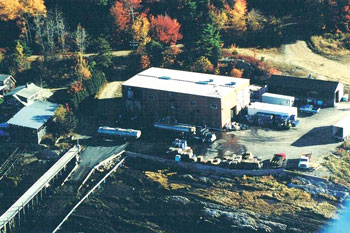The Business of Supplying Bait
Fishermen’s Voice Staff

Purse Line Bait facilities at Sebasco, Maine. Purseline outgrew facilities at Cundy’s Harbor before moving to this location in the 1990’s. A lot has to happen to herring between a seine and a handful of bait going into a bait bag. PLB Photo
The Maine lobster industry runs on bait. It also runs on diesel and coffee, but no bait, no lobster. Purseline Bait’s Jennie Bichrest spoke recently about her 20 years in the bait business. Purseline supplies bait to the mid coast area, roughly between West Harpswell to Friendship from the company’s location in Sebasco.
The company operates a fleet of trucks that travel the many miles of roads up and down mid coast peninsulas. They serve the dozens of bait dealers located in handy as well as remote locations. The service, said Bichrest, continues day and night, 7 days a week. She has nine regular employees and 15 in the summer. With trucks, equipment and schedules to maintain and customers to serve, the bait business is a full plate that requires a full deck to keep it running smoothly.
“We’re not a big corporation. It’s my employees, with me on the phone. We’re a local company that tries to give something back to the community,” said Bichrest.
“Not a lot of people realize the effort required or the range of factors that must be controlled to make a quality bait business survive and prosper,” she said.
Purseline barrels and salts bait. About 90% of the business is in selling bait to dealers. They also do trucking for other companies and sell some bait directly to boats. Bichrest has been in the bait business during one of the most rapidly changing periods for the lobster industry.
While she started out with and still maintains a goal of providing a quality product and good service, a lot has changed around her over the years. In her 20 years in the business she has seen things change from where fishermen go out in their own boats to seine their own bait, as she had, to at times preferring frozen bait from another country.
Lobstering at age 13, Bichrest continued to fish lobster when she started selling the pogies that her former husband Mark was seining in the late 1980’s. Pogies were in an up cycle, herring was not yet the dominant lobster bait choice and the price of most bait was cheap compared to today’s prices.
As pogies cycled down in Maine Bichrest went to Virginia for pogies and trucked them back to Maine. Soon the higher price of this supply led to a search for a local bait source. She found it in the seiner the Western Sea.
Regulatory changes would change the way fishermen fished and the bait business with it. Two day sets, using a lot of bait and 600 traps were typical. Regulatory threats led to 4 day sets, 800 traps and the more conservative use of bait. “Back then there was much less herring in use in our area,” said Bichrest. Pogies and redfish were much more common.
As her bait business grew she was about to lease a place on Cundy’s Wharf when an opportunity came up to buy a wharf location in Sebasco. The prospect of a stable location for the business was enough to close the deal. By 2000 she was hauling 3 days and selling bait 3 days. A couple of years later bait business demands led her to drop lobster fishing.
Today Purseline handles about 15 to 20 million pounds of bait annually. Bichrest said she built the business on quality and service. “I was a lobsterman and knew quality bait. I focused on better bait.” When she started in the early 1990’s many fishermen were indifferent to bait quality. But she sought to deliver better quality. She dump bodies built her trucks to carry a longer, but shallower load of fish to reduce crushing the lower level. She also trained her employees to properly salt the bait to keep it solid longer.
Service has sometimes meant delivering bait on Sundays for early Monday morning fishing days and making deliveries at 10 pm for a customer who has been caught short. Quality and service have built a base of what she called, “a lot of great customers.”
Times are different now than when Purseline started. “Back then,” said Bichrest, “we were all fishermen. Now there are divisions in the industry, caused in part by regulations that have compartmentalized us and made it appear we had to be against each other to survive. When I started out fishermen fished for ground fish, lobster, shrimp, and some caught their own bait.”
How bait is caught and supplied is different today. Reduced diversity in fishery options, regulatory pressures and the stress of making a profit has changed the way some people do business. All of this has also changed the bait business, said Bichrest. She noted more lobster dealers are now buying bait directly from herring seiners rather than from bait dealers.
Regulations forced specialization in order to build landings history to continue ground fishing for example. Bichrest said, “Getting bigger, focusing on one fishery and bigger profits seems to have displaced some part of the ‘community’ in the fishing industry. This year regulations have made re-rigging to shrimp for two days of fishing a losing proposition.”
Bichrest said she would like to see fishermen work together more. She has been active for years in fishery issues of all kind and a supporter of the annual Maine Fishermen’s Forum. Bichrest has been attend herring meetings since 1996, has been an advisory board member for more than 10 years and a member of the Maine Fishermen’s Wives board. Active engagement is a part of her belief that organizing, working together and shared information is better for individual fishermen and the fishing industry in the long run.
